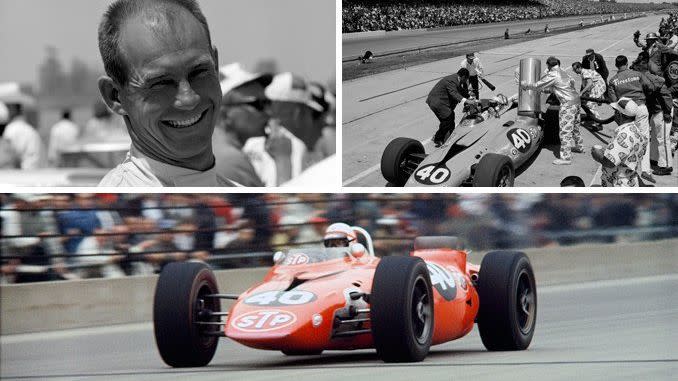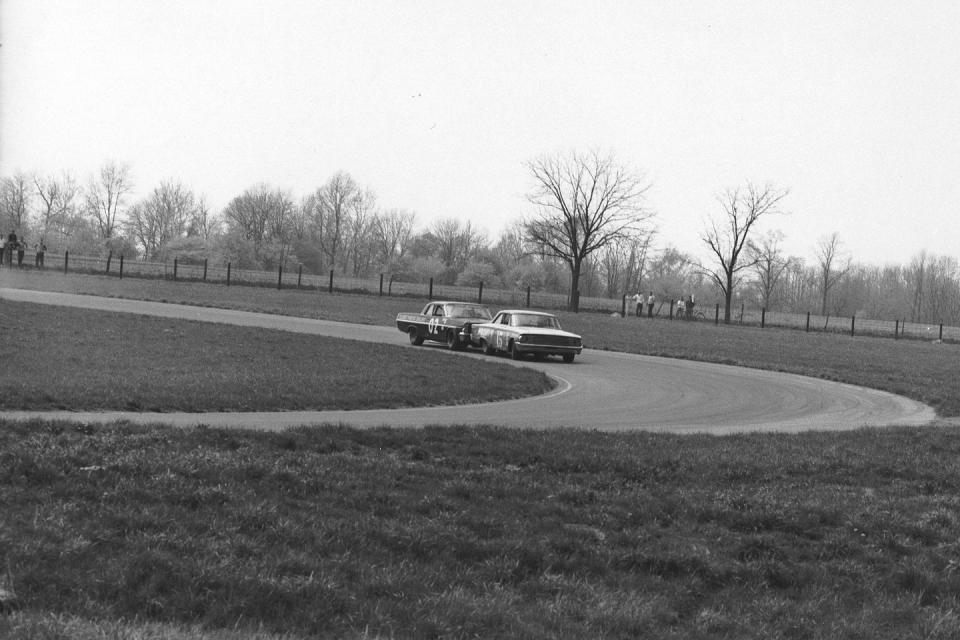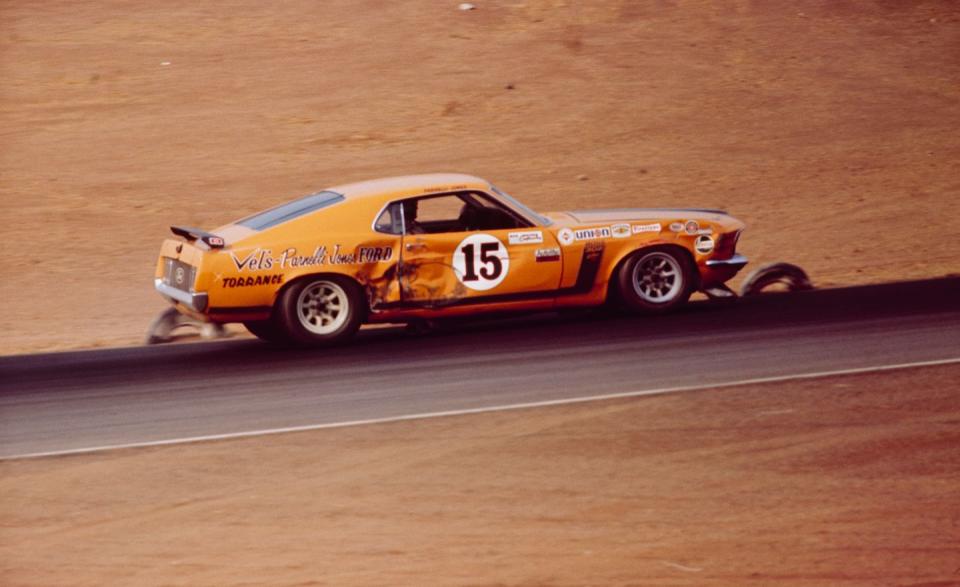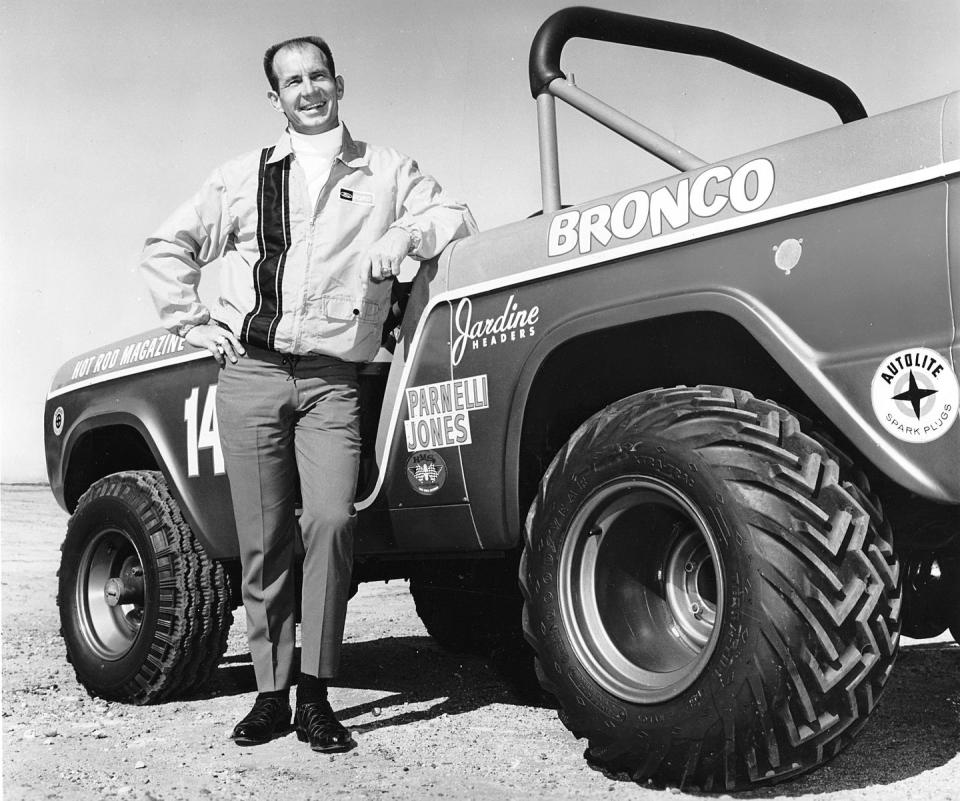Rufus Parnell "Parnelli" Jones, Indy 500 Champion, Dies at 90

"Hearst Magazines and Yahoo may earn commission or revenue on some items through these links."
"I was into horses when I was younger," Parnelli Jones told Car and Driver back in 2013. "And when I turned 16, I sold my horse and bought a hot rod. I had to work after school in this mechanic's garage to keep it running. Because I was doing that, my cousin took his wife's old '30 Ford and made a jalopy out of it. Because I was working in the garage, he thought I had some mechanical knowledge, and he used to let me warm the car up. And that sort of started the whole thing."
The whole thing was one of the most far-ranging and successful careers in the history of American motorsports. Rufus Parnell "Parnelli" Jones, who was born in Texarkana, Arkansas, on August 12, 1933, and raised in Southern California, and who won the 1963 Indianapolis 500, died on June 4, 2024, at age 90 in his longtime home of Torrance, California.
"I'm the kind of guy who likes to see what's on the other side of the hill," Jones explained about the diversity of his racing life. "So, I've enjoyed them all. Certainly, I enjoyed doing the Baja races as far as just having fun. Of course, winning Indianapolis is the most outstanding in my career. That was also fun because I adapted to Indy really well. And I had very much success as a rookie there and so on."
Jones's unusual name came from his mother's whimsy and the need to go racing. “My mother named me after a judge; he was the most successful person she knew,” he told Hot Rod magazine's Rob Kinnan in 2012. “His name was Rufus Parnell. She named me after him, and when I first started racing I was only 17 years old, and you had to be 21 at that time, so I needed some phony ID. My partner in the old jalopy that I ran used to call me Parnelli all the time, because there was a little girl at school named Nellie, and he'd call me Parnelli. When he made my phony ID up, the kids in this area, if I went by Rufus, would have known I wasn't 21 years old and that would have gotten out. So, when he lettered the car and made my phony ID, he did that. He originally spelled it Parnellie, but I dropped the e to make it sound more Italian.”
Jones's family moved from Arkansas to California when Parnelli was only two and the country was in the grips of the Great Depression. In the years after World War II, the variety of racing in Southern California was unmatched by any other region. When he was eight, his family moved to Torrance, in Los Angeles County's South Bay region, which was surrounded by dirt ovals. Jones's first racing was at the half-mile Carrell Speedway in neighboring Gardena in 1952, and after toning down his desire to beat everyone by the first corner of the race, his victories began accumulating.
Jones raced almost anything that had a seat during the 1950s, but he found his greatest success in sprint cars. In 1958, he joined the California Racing Association (CRA) series and earned Rookie of the Year honors. By 1959 he was splitting his time among CRA out west, the International Motor Contest Association (IMCA) sprinters in the Midwest, and United States Auto Club (USAC) events in the east. He took USAC's 1960 Midwest sprint-car crown, and in 1961 he earned USAC's first national sprint-car championship.

That success was enough to earn him his first ride in the then USAC-sanctioned Indianapolis 500.
Qualifying fifth, leading twice for a total of 27 laps, and finishing 12th during the 1961 Indianapolis 500, Jones was named co-Rookie of the Year alongside the hard-charging Bobby Marshman, who finished seventh. He came back for the 1962 race and set a new qualifying record of 150.370 mph, becoming the first driver to qualify at more than 150 mph. Though he led 120 of the 200 laps, Jones faded at the end of that race and finished seventh.

While 1963 was the year Colin Chapman showed up with a rear-engined Lotus that would revolutionize the Indy 500, it was also the year Parnelli Jones used J.C. Agajanian's big front-engined roadster to win the race. Leading 167 of the 200 laps with a record average speed of 143.137 mph, Jones's performance was one of the most dominant in the history of the Memorial Day race.
But it wasn’t one without controversy.
A few hours after the 500's postrace driver luncheon, Eddie Sachs approached Jones at a Holiday Inn near the speedway. According to an Associated Press report, Sachs asserted that Jones's roadster had spewed oil onto the track surface, causing Sachs to spin. No one is quite sure who called whom a liar first, but as the conversation grew louder, Jones reportedly threatened, "You call me a liar again and I'll bust you right in the mouth." Cleverly, Sachs replied, "You're a liar." So the 29-year-old Jones reared back and belted the 36-year-old Sachs, who had finished 17th, in the mouth.
Jones's now mighty reputation made him a sought-after gun for hire, running in stock cars, sprint cars, Indy cars, and sports cars for virtually anyone who would pay him. He won in practically all the series—including the stock-car division of the 1964 Pikes Peak Hill Climb—but never concentrated on any one of them to chase a championship.

After a pit fire, Jones ran 23rd in the 1964 Indy 500. He finished second to Jim Clark's dominant rear-engined Lotus in 1965. And then he came in 14th in 1966. It all served as prelude to the 1967 race, when Andy Granatelli hired him to drive the radical STP-Paxton turbine-powered, all-wheel-drive race car.
While Jones had only qualified sixth in the turbine car, the awesome ability of the machine was obvious. On the first lap of the race, Jones swept past four cars through Turn 1 and then caught and passed pole sitter Mario Andretti on the back stretch. He led 171 of the 200 laps that day and was never seriously challenged. Then, with four laps left, a gearbox bearing failed, and the car rolled to a halt. A.J. Foyt took the victory.
It was the last time Jones would drive in the 500. He continued to compete in SCCA Trans-Am and other sedan series. He even played in the dirt, running the Baja 1000 off-road race for the first time in 1968. But he was through with open-wheel racers.
Instead, in 1969 Jones and his partner, Velko "Vel" Miletich, formed Vel's Parnelli Jones (VPJ) Racing and began entering several different race series. Success came quickly.
Running a Ford-powered Colt under Johnny Lightning sponsorship with Al Unser in the cockpit, the VPJ team won the 1970 Indy 500 in only the team's second year. Then they came back and repeated in 1971. Beyond that, the team took the USAC Champ Car crown in '70 with Unser, then won it again in '71 and '72 with driver Joe Leonard. It was a spectacular start.
But even as the VPJ team was establishing itself, and Jones dabbled in real-estate investing and the separate Parnelli Jones, Inc., opened 47 Firestone tire stores, Jones wasn't quite done with driving. Two of his most legendary victories occurred during 1970 and 1971.
For the third straight year, in 1970 Jones signed on with the Bud Moore team in the Trans-Am series. Using Mustang Boss 302s, Jones had won four of the first 10 races and already earned Ford that year's manufacturer's championship. The 11th and final race of the year would take place at Riverside International Raceway in Southern California that October with Parnelli Jones in the #15 Ford Mustang Boss 302.

After qualifying on the pole, Jones was running away from the field early in the race. But a backmarker booted Jones into the desert while he was leading, sending him back to ninth place with a severely damaged car. Because the car was so hard to turn, Jones would smack the curbing to get the car up on two wheels through turns. During his rush back to the front, he set new lap records. With 10 laps left, he passed teammate George Follmer's Boss 302 to take the win. "It was an exciting one," he understated to C/D 43 years later. "I had to give it all I had, and all it had. It was one of my better drives."
Jones didn't return to the Trans-Am series in 1971 but turned his sights to revolutionizing off-road racing instead. Along with old friend Bill Stroppe, he constructed a tube-frame version of the Ford Bronco with a long-travel suspension that could practically fly over terrain other trucks had to slog through. Sponsored by Olympia Beer, the "Big Oly" Bronco cruised to overall victory in the 1970 Mexican 1000.

The off-road races were brutal. "They were tough, and you had to be in good shape physically," Jones told C/D. "You're sitting in the car for 15 or 16 hours. And it's the fact that you have to keep concentrating."
As Jones's driving career faded, he concentrated more and more on his race team. During the 1970s, the VPJ teams would innovate at Indy, run hard in the Formula 5000 road-racing series, and even on occasion enter a Funny Car in NHRA drag racing. The team also campaigned in Formula 1 from 1974 to early 1976, although without success.
Today many of the cars Jones drove during his career—and most of the cars the VPJ team built and competed with—are in museums. But Jones's legacy isn't only in those machines or his enshrinement in practically every motorsports hall of fame. It's in his sons, P.J. and Page, both of whom raced. And it's even in his grandson Jagger, whom Jones watched race as a 14-year-old in 2017.
Parnelli Jones's "whole thing" is among the fullest lives ever lived.
You Might Also Like

 Yahoo Autos
Yahoo Autos 